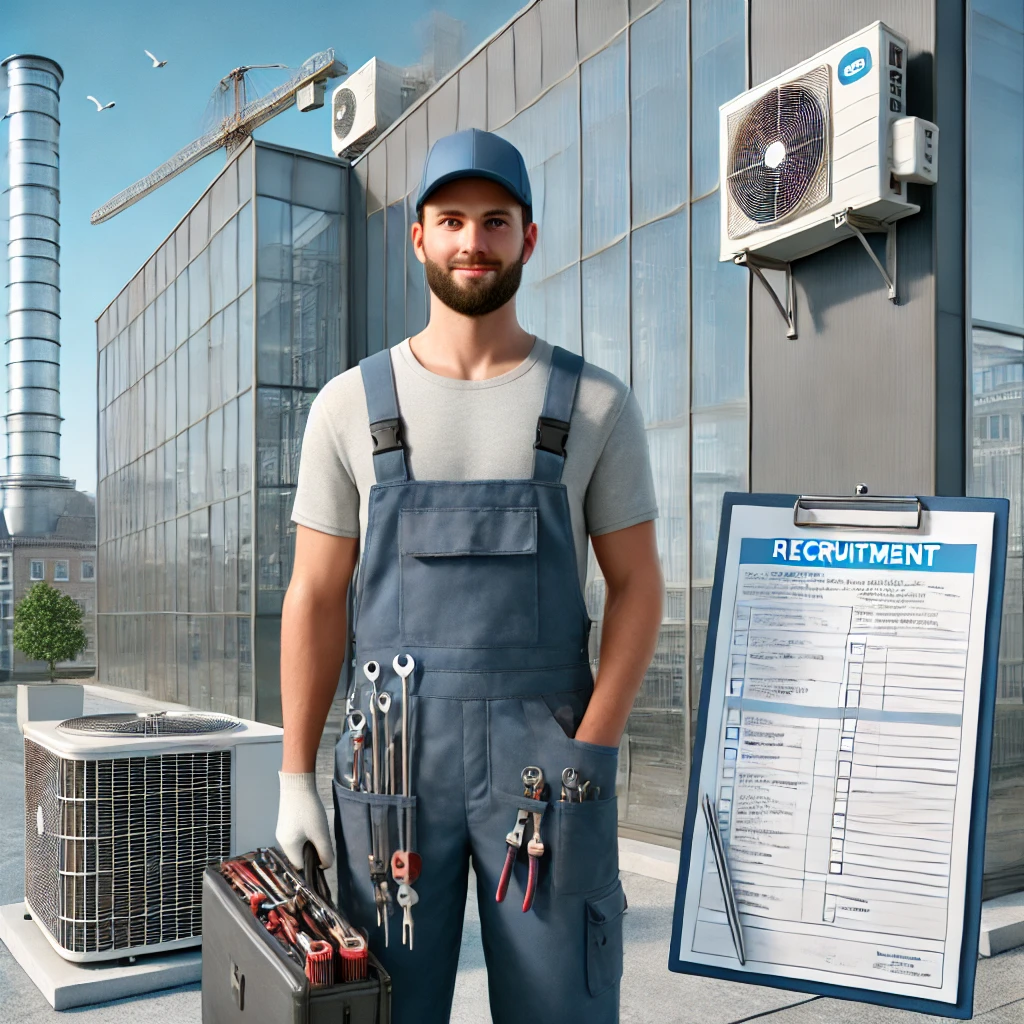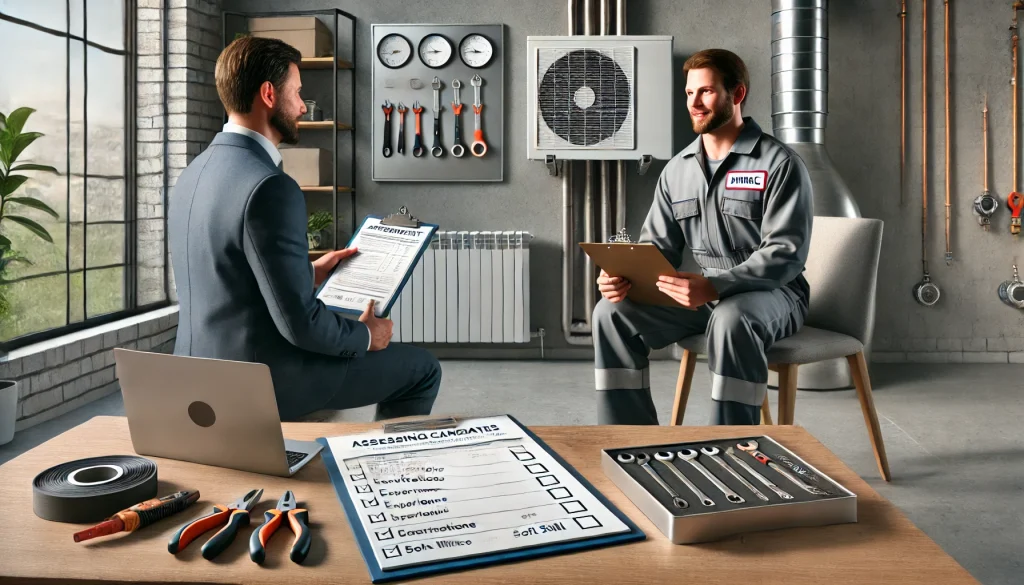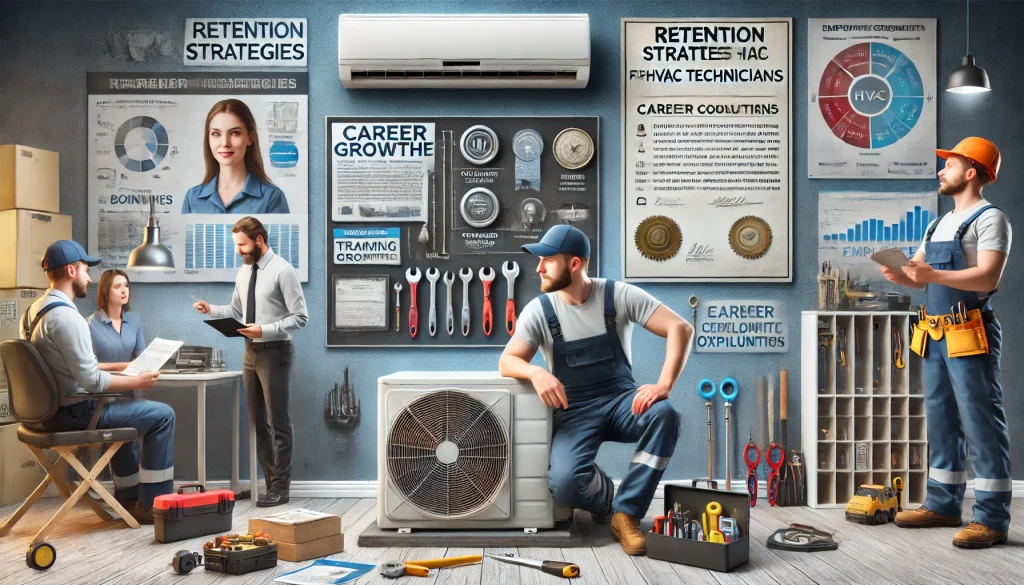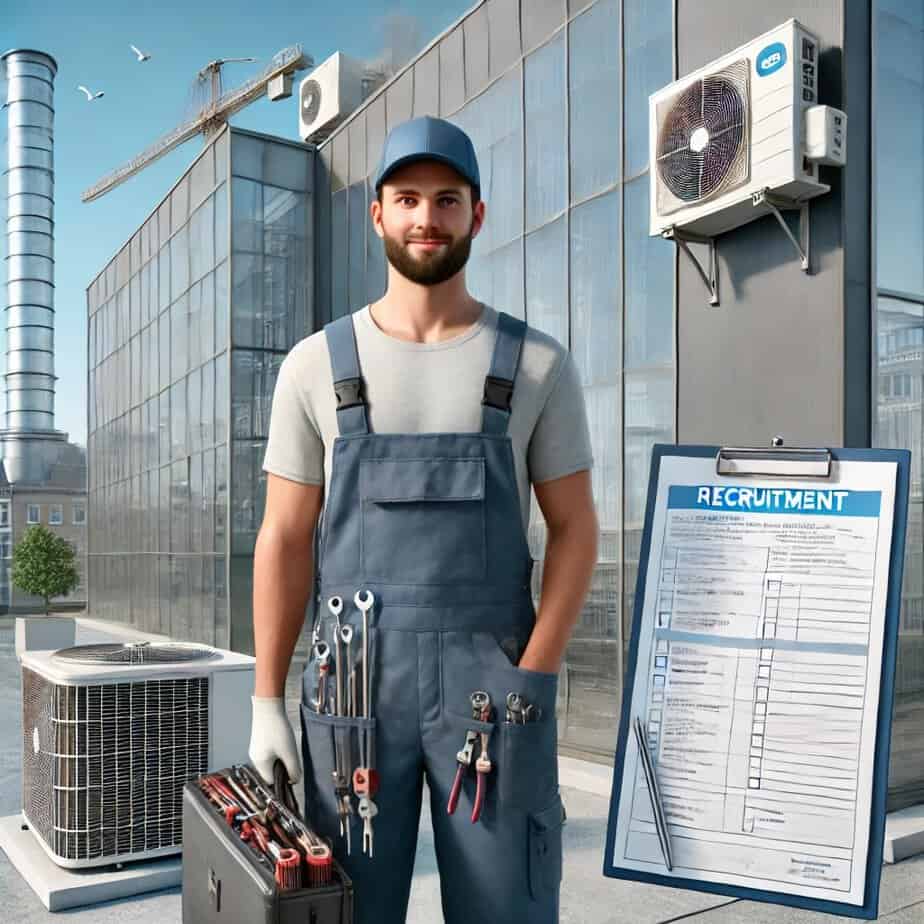Recruiting skilled HVAC technicians in the UK can be challenging, particularly in a highly competitive job market where demand for specialised talent outpaces supply. As HVAC systems grow more complex and energy-efficient technologies become more prevalent, finding technicians with both practical experience and specialised training has become increasingly important. HVAC technician recruitment, therefore, goes beyond simply filling vacancies—it’s about finding professionals who possess the expertise to handle both residential and commercial HVAC systems in a rapidly evolving industry.
This guide aims to provide UK employers with the tools and strategies to optimise their HVAC technician recruitment process. From understanding the essential skills and qualifications required to creating compelling job descriptions, we’ll explore every step of the recruitment journey. Employers who follow these best practices will not only attract top HVAC talent but also build a more stable and skilled workforce for the long term.

Understanding the Role of an HVAC Technician
An HVAC technician is responsible for installing, maintaining, and repairing heating, ventilation, and air conditioning systems, which are critical for maintaining indoor comfort in both residential and commercial settings. These technicians must possess a wide range of skills, including mechanical, electrical, and plumbing knowledge, to ensure systems operate efficiently. In addition, many UK-based HVAC systems now incorporate innovative technology, requiring technicians to understand how to integrate and maintain advanced control systems.
In the UK, HVAC technicians often specialise in either residential or commercial systems, and understanding these specialisations is crucial for employers during HVAC technician recruitment. Residential systems may involve smaller units, but the technician must often work directly with homeowners, requiring good communication and customer service skills. Commercial HVAC systems, on the other hand, are typically more extensive and more complex, requiring a different set of skills, such as managing large-scale installations or dealing with industrial refrigeration units.
Essential Qualifications to Look for in HVAC Technicians
Educational background and training required for HVAC professionals in the UK:
In the UK, HVAC technicians generally start their careers through formal training programs such as apprenticeships, vocational courses, or college diplomas. Typical qualifications include NVQ Levels 2 and 3 in Plumbing and Heating and City & Guilds diplomas in Refrigeration, Air Conditioning, and Heat Pump Systems. These qualifications not only provide technicians with a foundational knowledge of HVAC systems but also ensure they are capable of following health and safety regulations, which are paramount in this industry.
When conducting HVAC technician recruitment, UK employers need to verify that candidates have completed these recognised qualifications. Additionally, many employers prefer technicians who have ongoing professional development through certifications like F-Gas, which qualifies them to work with refrigeration systems. Given the increasing complexity of HVAC systems, staying current with industry standards through regular training is critical to ensure technicians remain skilled and compliant with regulations.
Certifications and their importance in HVAC technician recruitment:
In the UK, certifications are a vital component of HVAC technician recruitment, as they demonstrate a candidate’s commitment to their trade and provide assurance that they meet legal and safety requirements. The F-Gas certification is particularly important for any technician who will be working with refrigeration systems, as it ensures they are qualified to handle fluorinated gases safely and responsibly. Other valuable certifications include the CSCS (Construction Skills Certification Scheme) card, which is often required on construction sites, and manufacturer-specific certifications that indicate expertise in particular HVAC brands.
These certifications are not just about ticking boxes—they directly impact a technician’s ability to perform their job effectively and legally. Employers should prioritise candidates with up-to-date certifications to ensure compliance with UK regulations and avoid potential legal issues down the road. Moreover, hiring certified technicians can enhance a company’s reputation, as clients are more likely to trust a business that employs properly qualified professionals.
Experience levels (entry-level vs. experienced technicians):
During HVAC technician recruitment, employers must decide whether they are looking for entry-level or experienced technicians. Entry-level candidates may be more affordable and moldable to a company’s culture and processes, but they will require more training and supervision. On the other hand, experienced technicians, though often more expensive, bring a wealth of knowledge that can help in troubleshooting complex systems, improving efficiency, and training junior staff.
UK employers should carefully assess their company’s needs before deciding which type of candidate to pursue. For larger projects or more technically demanding systems, experienced HVAC technicians may be the better choice. However, if the company has a solid training program and needs to fill several positions, entry-level hires could provide a cost-effective solution while offering the opportunity to develop long-term talent.
Importance of soft skills: communication, customer service, and problem-solving:
While technical expertise is essential, soft skills play an equally important role in HVAC technician recruitment. Technicians often interact directly with clients, whether in residential homes or commercial properties, and their ability to communicate clearly and professionally can influence customer satisfaction. Strong customer service skills ensure technicians can explain problems and solutions in layperson’s terms, which builds trust and improves the overall client experience.
Problem-solving is another crucial skill, as HVAC technicians frequently encounter complex system failures that require creative and efficient solutions. A technician who can diagnose issues quickly and accurately will save the employer time and money while keeping clients happy. Employers should evaluate these soft skills during the interview process, as they can be just as important as technical qualifications when building a well-rounded team.

Effective Recruitment Strategies
In-house vs. Recruitment Agency: Pros and cons of each:
When it comes to HVAC technician recruitment, employers often face the decision of whether to manage the process in-house or use a recruitment agency. Handling recruitment internally allows businesses to have more control over the process and better alignment with company culture. It also tends to be more cost-effective in the long run if your company has an experienced HR team capable of handling the specific requirements of HVAC recruitment. However, in-house recruitment can be time-consuming, especially for small businesses with limited resources.
On the other hand, recruitment agencies specialising in technical industries like HVAC can streamline the process by leveraging their networks and expertise. These agencies often have access to a broader pool of qualified candidates and can speed up the recruitment process, saving time for employers. The downside is that agencies typically charge a fee for their services, which can be costly. Ultimately, the choice depends on your company’s resources and urgency in filling HVAC technician roles.
Online Job Portals: Best platforms for posting HVAC job openings in the UK:
Online job portals are an essential tool for HVAC technician recruitment, as they allow employers to reach a large number of candidates quickly. In the UK, platforms like Indeed, Reed, and Totaljobs are widely used for posting job listings. These platforms offer the advantage of being well-known and frequently visited, ensuring your job post is seen by a large audience. Some of these platforms also provide industry-specific categories, which can help narrow down your search for qualified HVAC technicians.
For more specialised recruitment, it may be worth considering niche job boards focused on the HVAC industry. Websites like HVACJobs.com or Trade Counter News are excellent places to target professionals with relevant experience. By using both general job portals and industry-specific sites, UK employers can maximise their reach and increase the likelihood of attracting qualified candidates.
Social Media Recruitment: Leveraging LinkedIn and industry-specific forums:
Social media platforms are becoming increasingly valuable for HVAC technician recruitment, particularly LinkedIn, which is a hub for professional networking. Employers can use LinkedIn to post job vacancies, search for candidates with relevant skills, and engage with potential hires directly. Additionally, HVAC groups and forums on platforms like Facebook and Reddit allow employers to connect with a more specialised audience, including HVAC professionals who may not be actively searching for jobs but are open to new opportunities.
By engaging in discussions within these industry-specific groups, employers can build relationships with potential candidates and showcase their company as a desirable place to work. This approach can also increase visibility for your job postings among professionals who may not have seen them on traditional job boards.
Trade Shows and Networking Events: How to connect with potential candidates through industry events:
Trade shows and networking events provide a unique opportunity for HVAC technician recruitment, as they allow employers to meet potential candidates face-to-face. Events such as the HVAC & Refrigeration Show in the UK bring together professionals from across the industry, creating an ideal environment for recruiting. Employers can use these events to showcase their company culture, discuss upcoming projects, and gather resumes from interested technicians.
Attending these events also offers employers the chance to assess candidates in person, which can provide valuable insights into their communication skills and professionalism. In addition, trade shows often include seminars and workshops where employers can identify technicians who are actively engaged in learning and staying updated on industry trends.
Referrals: Using employee networks to find trustworthy candidates:
Employee referrals can be an incredibly effective strategy in HVAC technician recruitment. Technicians already employed by your company likely know others in the industry and can recommend candidates who have the right skills and fit within your company culture. Offering referral bonuses or incentives can encourage your current employees to actively participate in the recruitment process.
Referrals typically lead to quicker hires and candidates with a higher likelihood of long-term retention, as employees are more likely to recommend individuals they believe will succeed. This method also reduces the time and cost associated with more traditional recruitment methods, making it an excellent option for companies looking to hire quickly and efficiently.
Creating a Compelling Job Description
Key elements to include in an HVAC technician job post (job title, qualifications, responsibilities, etc.):
Creating a clear and detailed job description is crucial for HVAC technician recruitment. The job title should be specific, such as “HVAC Technician – Commercial Systems” or “Residential HVAC Installer,” to attract candidates with relevant experience. The job description should outline the qualifications required, including education, certifications, and experience, to ensure that only qualified candidates apply. Including a list of key responsibilities, such as maintenance, repair, and installation of HVAC systems, helps candidates understand the scope of the role.
Additionally, it’s important to mention any specialised skills or knowledge required, such as experience with specific HVAC brands or smart thermostat systems. Providing details about your company’s work environment, whether it involves commercial primarily or residential projects, can also help attract candidates who are well-suited to the role.
How to highlight specialised skills to attract the suitable candidates:
In the competitive field of HVAC technician recruitment, highlighting specialised skills in your job description can help your post stand out and attract top talent. For example, if your company works on large-scale commercial projects, emphasising the need for experience with industrial HVAC systems or refrigeration units will filter out candidates who may not have the required expertise. Similarly, if your business focuses on residential installations, highlighting customer service skills and experience with residential systems can help target suitable applicants.
Employers should also make sure to mention any advanced technologies they use, such as energy-efficient or environmentally friendly systems. Technicians with experience in these areas are often in high demand, and clearly stating these requirements will not only help attract qualified candidates but also position your company as a leader in the field of HVAC innovation.
Tips for making your job description stand out from competitors:
To stand out in HVAC technician recruitment, it’s essential to create a job description that is both informative and engaging. One way to do this is by including details about your company culture and any unique benefits you offer, such as opportunities for ongoing training, career advancement, or flexible working hours. This can make your job posting more appealing compared to standard listings that focus solely on technical requirements.
Another tip is to include a section on the company’s projects and successes, mainly if you’ve worked on high-profile or innovative HVAC installations. This gives potential candidates a sense of the type of work they’ll be involved in and the opportunity to be part of a forward-thinking team. Using language that conveys enthusiasm and growth potential can also make your job post more attractive to ambitious candidates.

Interviewing and Assessing Candidates
Types of technical and behavioural interview questions to ask:
During HVAC technician recruitment, asking the right interview questions is essential for assessing a candidate’s technical knowledge and ability to work effectively in the field. Technical questions should focus on real-world scenarios, such as asking how a candidate would diagnose a malfunctioning HVAC system or how they would ensure a system is energy-efficient. This allows employers to gauge the candidate’s problem-solving abilities and technical expertise.
Behavioural questions, on the other hand, help assess a candidate’s soft skills, such as how they handle stressful situations or work in a team. For example, you might ask how a candidate dealt with a demanding customer in the past or how they managed a project deadline. These questions help employers understand how a technician would perform in various workplace scenarios beyond their technical skills.
How to assess practical HVAC skills (case studies, hands-on tests, etc.):
In addition to interview questions, practical assessments can be invaluable during HVAC technician recruitment. Many UK employers choose to include a hands-on test as part of the interview process, allowing candidates to demonstrate their skills in a controlled environment. This might involve diagnosing a problem with a mock HVAC system or performing a basic installation. Practical tests give employers a better sense of how well candidates can apply their knowledge in real-world situations.
Another effective method is to use case studies, where candidates are given a written scenario and asked to explain how they would solve the issue. This approach allows employers to assess both the candidate’s technical knowledge and their thought process when addressing complex problems.
The importance of cultural fit and alignment with company values:
While technical skills are critical, cultural fit is equally vital in HVAC technician recruitment. Technicians often work closely with other team members and directly interact with customers, so they must align with your company’s values and work culture. Employers should assess whether candidates share similar attitudes toward teamwork, professionalism, and customer service.
A candidate who is a good cultural fit is more likely to integrate well into your team, leading to better overall performance and job satisfaction. This can also result in lower turnover rates, as technicians who feel aligned with your company’s mission and values are more likely to stay with the organisation long-term.
Red flags to watch out for during the interview process:
During the interview process, there are several red flags that employers should be aware of when conducting HVAC technician recruitment. One major red flag is a lack of up-to-date certifications or an unwillingness to pursue ongoing training. In the fast-evolving HVAC industry, technicians need to stay current with new technologies and regulations, and a candidate who does not prioritise continuous learning may struggle to keep up with industry standards.
Another red flag is a poor attitude towards safety. HVAC technicians are responsible for working with complex systems that can be hazardous if not handled properly, and a candidate who downplays the importance of safety protocols is a potential liability. Employers should also be cautious of candidates who provide vague or evasive answers when asked about past job performance or customer interactions, as this may indicate a lack of experience or accountability.
Competitive Compensation and Benefits
Typical salary ranges for HVAC technicians in the UK based on experience and region:
Salaries for HVAC technicians in the UK vary based on experience, qualifications, and geographic location. On average, entry-level HVAC technicians can expect to earn between £18,000 and £25,000 per year, while more experienced technicians with specialised skills can earn between £30,000 and £40,000. In major cities such as London or Manchester, where the cost of living is higher, salaries may be closer to the upper end of this range.
Offering competitive salaries is crucial for successful HVAC technician recruitment, as highly qualified candidates are often in demand and may receive multiple job offers. Employers should research the average salary range for their region and adjust their compensation packages accordingly to attract top talent. Providing additional benefits, such as bonuses for completing certifications or performance incentives, can further enhance the appeal of your job offer.
Benefits that attract top talent (pension plans, professional development, flexible hours):
In addition to competitive salaries, offering attractive benefits is an effective way to stand out in HVAC technician recruitment. Many UK HVAC technicians value professional development opportunities, such as paid training for additional certifications or manufacturer-specific qualifications. Offering these opportunities not only attracts ambitious technicians but also benefits your company by ensuring your staff stays up-to-date with the latest industry advancements.
Flexible working hours and a strong pension plan are also highly appealing benefits that can set your job offer apart from competitors. Technicians who have some control over their work schedule may have a better work-life balance, leading to higher job satisfaction and productivity. A generous pension plan demonstrates a long-term investment in your employees, which can be a deciding factor for technicians looking for a stable and rewarding career.
Offering long-term career growth opportunities:
HVAC technicians are more likely to join and stay with companies that offer clear paths for career progression. During HVAC technician recruitment, employers should emphasise opportunities for advancement, such as moving into senior technician roles, project management, or even supervisory positions. Offering a structured career ladder can make your company more attractive to ambitious candidates who are looking for long-term stability and growth.
Employers should also consider creating mentorship programs where more experienced technicians can guide entry-level hires, fostering a supportive work environment. This not only aids in retaining new hires but also ensures that your team continues to develop its skills, benefiting both the technicians and the business.

Retention Strategies for HVAC Technicians
Why retention is as necessary as recruitment:
While finding the right candidate through HVAC technician recruitment is critical, retaining that talent is just as crucial for maintaining a solid workforce. High turnover rates can be costly, leading to constant recruitment cycles, loss of productivity, and service disruption. In a competitive industry like HVAC, where skilled technicians are in high demand, employers must make a concerted effort to retain top talent by creating an environment where technicians feel valued and engaged.
Effective retention strategies not only improve employee satisfaction but also contribute to the overall success of your business. Happy and engaged employees are more likely to provide excellent service to clients, which enhances your company’s reputation and drives repeat business. Investing in retention ultimately leads to long-term stability and reduced recruitment costs.
Providing ongoing training and certification opportunities:
One of the best ways to retain HVAC technicians is by offering ongoing training and certification opportunities. As technology in the HVAC industry continues to evolve, technicians must stay current with new systems, tools, and regulations. Employers who invest in their employees’ education by offering paid training programs, apprenticeships, and opportunities to earn certifications like F-Gas or NVQ Level 3 will not only enhance their technicians’ skills but also improve retention.
Technicians who see that their employer is willing to invest in their professional growth are more likely to stay with the company. Additionally, a well-trained team ensures that your business remains competitive, as technicians with up-to-date skills can handle the latest HVAC systems and meet customer expectations.
Creating a supportive work environment with clear career advancement paths:
A supportive work environment is essential for employee retention in HVAC technician recruitment. Technicians should feel that their contributions are valued and that they have the resources needed to succeed in their roles. Employers can foster this type of environment by offering regular feedback, recognising achievements, and providing opportunities for team collaboration. Regular check-ins and open lines of communication help ensure that technicians feel heard and supported.
Clear career advancement paths are also crucial for retaining ambitious technicians. Employers should outline potential growth opportunities during the recruitment process and provide ongoing support for employees looking to advance. Whether through promotions, leadership training, or specialised roles, offering upward mobility encourages technicians to stay with your company as they pursue their career goals.
Offering incentives and recognition programs:
Incentives and recognition programs can play a crucial role in HVAC technician retention. Offering bonuses or financial rewards for completing certifications, reaching performance goals, or going above and beyond in their role shows technicians that their hard work is appreciated. Non-monetary incentives, such as additional time off or public recognition during company meetings, can also help boost morale.
And keep employees engaged.
Regularly recognising achievements fosters a positive company culture where technicians feel motivated and valued. This approach not only improves employee satisfaction but also strengthens your company’s reputation, making it easier to attract new talent through HVAC technician recruitment.
Conclusion
Successful HVAC technician recruitment is about more than just filling vacancies; it’s about building a skilled and dedicated team that will contribute to the long-term success of your business. By understanding the essential qualifications to look for, creating compelling job descriptions, and implementing effective retention strategies, UK employers can attract and retain top talent in this competitive industry. Investing in your recruitment process will not only improve the quality of your hires but also ensure that your business thrives in an ever-evolving market. Now is the time to review your HVAC technician recruitment strategy and make the necessary adjustments to secure the talent your business needs.
